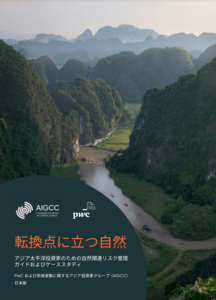Japan’s capital market and companies face moderate to high dependency on nature, especially the energy sector and the food, beverage and tobacco sector.
The data released today by AIGCC shows that public equities in Japan are particularly exposed to nature-related risks, with 18%, or US$938 billion, of the local stock market’s capitalisation comprising companies in sectors with a higher direct dependence on nature.
For example, the energy sector in Japan comprises 5.5%, or US$284 billion, of Tokyo Stock Exchange’s (TSE) total market capitalisation. Energy companies, especially in the integrated oil and gas industry, are highly dependent on ground and surface water. Given Japan’s robust trade activity in energy imports, Japan is also exposed to nature risks and opportunities in other markets.
Overall, 20%, or US$6.72 trillion, of Asia Pacific’s Gross Value Added (GVA) is in economic sectors are highly directly dependent on nature. This includes reliance on fertile soils, clean water, pollination, and climate stability, all of which are in serious decline in many parts of the region.
Comparatively, Japan’s GVA with higher dependency on nature is at 12%, or US$603 billion.
- For example, the Food, Beverage, and Tobacco sector in Japan makes a high relative contribution to its GVA (2.9%), compared to APAC (2%) and global figures (1.9%). Companies in this sector are highly reliant on surface and groundwater as a direct input for the production process. A loss of these ecosystem services would lead to a critical disruption of production processes.
- The differences between Japan and APAC can be attributed to Japan’s lower exposure to the agricultural sector, compared to APAC. Japan’s economy is relatively less reliant on the agricultural sector, with the sector accounting for 0.9%, or US$44 billion, of the economy’s GVA,
- In APAC, the agricultural sector contributes to 5.3%, or US$1.78 trillion of the region’s GVA.
However, Japan’s sectors have a higher percentage of moderate dependency (38%) on nature compared to APAC overall (33%).

Download the Report (Japanese only)
Download the Summary Slides (Japanese only)
Japan’s progress in managing nature-related risks
The Japanese government and corporates and investors in Japan have started to address nature degradation and mitigate nature-related risks. Japanese companies make up the largest cohort of early adopters of the Taskforce on Nature-related Financial Disclosures (TNFD), accounting for 25% of early adopters globally. Japan has also established a TNFD consultation group, co-convened by Keidanren Committee on Nature Conservation (KCNC), Norinchukin Bank, and MS&AD Insurance Group, to bring together private sector organisations to discuss nature-related business and finance issues and the future adoption of the TNFD framework.
Quotes
AIGCC Director of Investor Practice, Monica Bae said: “Japan’s economy, like others across Asia-Pacific, is deeply reliant upon healthy ecosystems. Nature loss translates to financial risk, and it’s a threat we can’t afford to ignore. New analysis in the Japan edition of our Nature at a Tipping Point report offers a critical first step for Japanese investors to assess how ecosystem decline can impact their portfolios.
“Transitioning to a nature-positive future unlocks vast opportunities for investors. By proactively integrating nature-related risks into their investment strategies, Japanese investors can position themselves to thrive in a sustainable and resilient future. AIGCC commends the early actions that Japanese policymakers, investors and companies have taken thus far. And we actively support them in their journey by advocating for policies that promote nature-positive practices and encouraging investment in nature-based solutions.”
AIGCC Forest and Land Use Working Group Investor Co-Chair* Seiji Kawazoe said: “Countries that are dependent on imports/exports like many in Asia, have natural capital related exposures and have no place to hide. It is clear from the new guidance from AIGCC and PwC that investors need to understand companies’ exposures that are material to their operations. It is encouraging to see some leading companies and investors opting to be early adopters of TNFD, with Japan leading by example with a good policy support from the government. We hope that investors and companies can be more proactive in their natural capital assessments and disclosures.”
Notes for editors
The Nature at a Tipping Point – Japan edition report by AIGCC and PwC is available in English and Japanese. The new Japan edition builds on an earlier edition of the report, with added analysis on Japan’s capital market and sector dependency on nature. Both editions will help investors in Japan and in the broader APAC region prepare to manage these nature-related risks.
The research covers 14 APAC territories – Australia, China, Hong Kong, India, Indonesia, Japan, Malaysia, New Zealand, Philippines, Singapore, South Korea, Thailand, Taiwan, and Vietnam.
PwC’s analysis draws on data from the ENCORE database designed for financial institutions to assess their exposure to natural capital risks according to economic sector and geographical location.
AIGCC previewed the Nature at a Tipping Point – Japan edition report on 20 May at an in-person seminar where Masami Hasegawa, Secretary General, Keidanren Committee on Nature Conservation (KCNC) was a guest speaker and Makoto Haraguchi, TNFD dedicated SVP, Corporate Sustainability Dept, TNFD Taskforce member, MS&AD Insurance Group Holdings, delivered the keynote speech. This was followed by a panel discussion, moderated by Monica Bae, Director of Investor Practice, AIGCC, featuring Dai Yamawaki, PhD, CFA, Senior ESG Investment Manager, Nomura Asset Management; Masakatsu Takahashi, ESG Promotion, Vice President, Kao Corporation; and Takeshi Wada, Senior Stewardship Officer, Sumitomo Mitsui Trust Asset Management.
*AIGCC’s Forest and Land Use working group is led by co-chairs: Jane Karen Ho, Head of Stewardship for Asia Pacific, BNP Paribas Asset Management and Seiji Kawazoe, Global Initiatives Fellow, Sumitomo Mitsui Trust Asset Management.